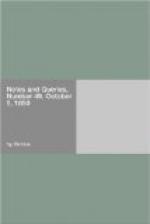“Most busy-less when I do it.”
In restoring the old text I had, therefore, to contend with prepossession, against which, it seems, the Rev. Mr. Dyce was not proof, although I only know it from MR. SINGER’S letter, never having looked into the book in which I suppose, the opinion is advanced.
One reason why I should reject the substitution of “busy-less,” even if I had not a better mode of overcoming the difficulty, is properly adverted to by MR. SINGER, viz. that the word was not in use in the time of Shakspeare. The only authority for it, at any period, quoted in Todd’s Johnson, is this very (as I contend) corrupted passage in the Tempest; I have not met with it at all in any of the older dictionaries I have been able to consult; and unless the Rev. Mr. Dyce have been more fortunate, he was a little short-sighted, as well as a little angry, when he wrote his note upon mine. Had he taken more time to reflect, he might have found that after all Theobald and I are not so much at odds, although he arrives at his end by varying from, and I at mine by adhering to, the ancient authorities. In fact, I gain some confirmation of what, I believe, is the true meaning of Shakspeare, out of the very corruption Theobald introduced, and the Rev. Mr. Dyce, to my surprise, supports. I should have expected him to be the very last man who would advocate an abandonment of what has been handed down to us in every old edition of the play.
The key of the whole speech of Ferdinand is contained in its very outset:—
“There be some sports are painful,
and their labour
Delight in them sets off;”
and the poet has said nearly the same thing in “Macbeth:”
“The labour we delight in physics pain.”
It is because Ferdinand delights in the labour that he does not feel it irksome:
“This my mean task
Would be as heavy to me as odious; but
The mistress which I serve quickens what’s
dead,
And makes my labours pleasure.”
He, therefore, tells us, at the close, that his labours are refreshed by the sweet thoughts of her; that, in fact, his toil is no toil, and that when he is “most busy” he “least does it,” and suffers least under it. The delight he takes in his “mean task” renders it none.
Such I take to be the clear meaning of the poet, though somewhat obscurely and paradoxically expressed—
“Most busy, least when I do it;”
and when Theobald proposed to substitute
“Most busy-less when I do it,”
he saw, though perhaps not quite distinctly, that such was the poet’s intention, only, as I have said above, he arrived at it by altering, and I by adhering to, the poet’s language. I may be allowed to add that I came to my conclusion many years before I was asked to put my name to an edition of Shakspeare, which interrupted one of the most valuable friendships I ever formed.




